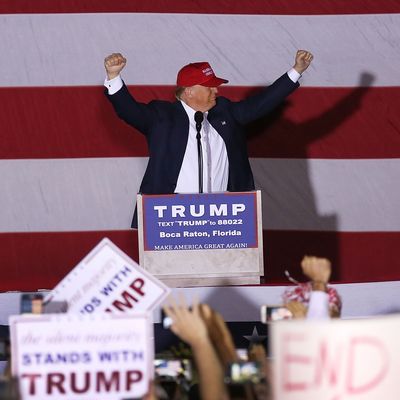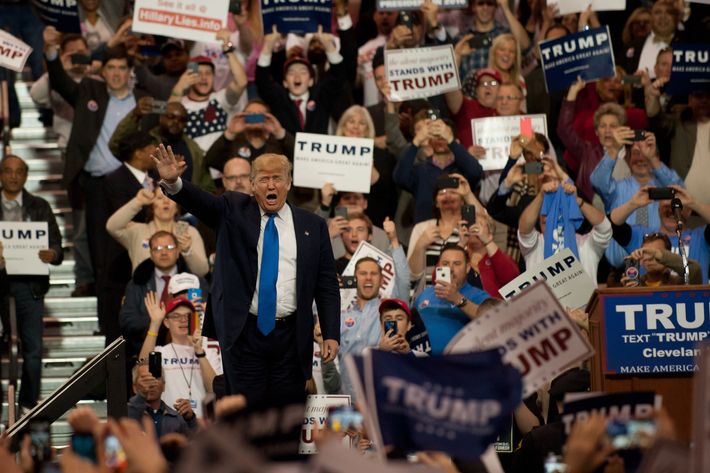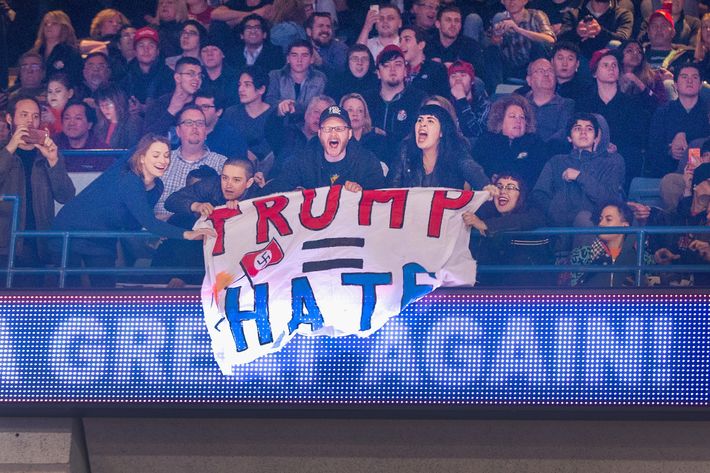
While it’s unlikely that anyone underestimates Donald Trump’s political candidacy anymore, a string of violent events at recent Trump rallies, and the candidate’s inflammatory comments on the incidents, have cast his campaign in a disturbing new light. Responding to Trump’s thinly veiled threat to send his supporters to disrupt Bernie Sanders events, as well as Trump’s interest in paying the legal fees of a supporter who attacked (and later threatened to kill) a peaceful protester in North Carolina last week, Vox’s Matt Yglesias is no longer content to simply smirk at the GOP’s Trump-driven chaos, arguing that the implications “for what President Trump might do in the White House are terrifying and go well beyond any dispute over public policy”:
The framers of the Constitution rather sharply circumscribed the president’s authority to make and repeal legislation, making it in many respects a weaker office than the prime ministerships of more majoritarian countries. But the president and his appointees have enormous discretion over the enforcement of existing laws. Putting a leader who would condone violence against the supporters of his political opponents in charge of the federal law enforcement apparatus is frightening. Giving him the power to unilaterally issue pardons is terrifying.
There have been clear signs all year that this was the direction the Trump phenomenon was heading, but I assumed that as he got closer to the Republican nomination Trump would tone down his extreme behavior in order to demonstrate his acceptability to mainstream voters. In fact, he has done the opposite.
Taking another angle, long-time political columnist Mike Barnicle, comparing Trump with Robert F. Kennedy for the Daily Beast, suggests that Trump and his passionate crowds have become a kind of delusional superorganism:
[S]lowly, surely and inevitably Trump seems to have surrendered to the narcotic of adulation and aspiration that flows from his large, boisterous, often angry crowds. It seems as if his ego and narcissism encourage him to think and believe that no other candidate has ever heard such cheering, received such adulation or applause. A rookie’s weakness.
He goes on to note that no one should have been surprised by what happened on Friday:
The weekend’s eruptions in St. Louis and Chicago around Trump’s candidacy were nothing new. The flame has been simmering for months, the low fire burning beneath the surface as the candidate arrives with an arsonist’s vocabulary, standing off to the side as the crowd roars approval.
Trump does not have the dark heart of a racist or a hater. He is, it appears, simply a man of huge ego and narcissism whose ambition, chip on his shoulder, his background and the fact he feels he has never been truly respected now prevent him from seeing what is actually right in front of him: ordinary Americans left behind by an economy and a culture that has damaged the lives, dreams and hopes of so many who listen to him and are quickly emboldened to behave like an army of antagonists to the unseen enemies who stole a country that exists only in myth.
Trump’s words do not inspire his crowds. They anger. He does not encourage. He aggravates. He does not appeal to our strength. He focuses on the weakest elements of human nature, envy, anxiety and apprehension of what might happen to America without him at the helm.
Barnicle’s analysis is especially intriguing when you compare it to Trump’s stubborn “I’m-just-the-messenger” stance when it comes to differentiating his ideas from those of his supporters. In response to all the criticism he has received over the weekend, Trump has been increasingly insistent that he is not the offending party, but rather some kind of neutral conduit for the anger and frustrations of the country, thus excusing himself from any responsibility for his movement’s darker edges.

The GOP front-runner isn’t the only one being criticized over Friday’s events, however. Even conservatives who seem to despise Trump have called out Chicago’s anti-Trump protesters, saying they went too far in their provocations. While Talking Points Memo’s Josh Marshall doesn’t think it’s appropriate to equate Trump’s actions with those of the liberal protesters opposing him, he worries that we’ve entered a “climate of agitation and violence” which could weaken the societal barriers that help protect politically opposed Americans from each other:
What we have seen over the last two weeks isn’t just an escalation of chaos and low level violence but a progressive normalization of unacceptable behavior — more racist verbal attacks, more violence. This is in turn clearly attracting more people who want trouble — on both sides. If you’re an angry racist who wants to act out on his anger, can you imagine any better place to go than a Trump rally? If you hate Trump, his supporters and all he stands for and want to get physical about it, where best to go? […]
The climate Trump is creating at his events is one that not only disinhibits people who normally act within acceptable societal norms. He is drawing in, like moths to a flame, those who most want to act out on their animosities, drives and beliefs. It is the kind of climate where someone will eventually get killed.
Then again, as The New Yorker’s John Cassidy points out, did anybody really expect liberals, particularly the rising social-justice movements, to just sit back and let Trump’s rise happen without some kind of response?
It isn’t every day that a self-promoting huckster with an authoritarian streak — one who has endorsed torture, accused American Muslims of cheering 9/11, and called undocumented Mexican immigrants “criminals, drug dealers, rapists” — stands on the verge of becoming the Presidential candidate of a major political party. To many members of minority groups, the sight of Trump and Trumpism atop a national ticket would represent a grievous insult to their dignity, and a potential threat to their well-being; to many moderates, liberals, and leftists of all backgrounds, it would represent a moral outrage. The anti-Trump forces won’t stand back and let him parade around the country unopposed. They will exercise their democratic right to protest against him and what he represents, and some of them will be disruptive. Which, doubtless, will provoke more anger from Trump and his supporters.

But for the American Conservative’s Rod Dreher, any repeat of what happened in Chicago will just make a stronger argument for Trump’s candidacy:
What happened [Friday night] in Chicago is why we need Trump, as obnoxious as he is, to keep going. I am not a Trump supporter, and I reject much of his rhetoric. But he has a right to give a speech, even an obnoxious speech, without it being interrupted by demonstrators. All of us do. Trump is revealing how impossible it is to have a normal democracy with the activist left, who think their crying need for “safe spaces” gives them the right to silence their opponents.
No. This political correctness needs to be opposed, and it needs to be opposed with force. I don’t know why the police couldn’t handle this situation, but they had better be on it in the future, because many Americans will not stand for this. What those protesters [did Friday night was] create a lot more Trump voters out of people who are sick and tired of privileged leftists using thug tactics to silence their opponents.
Putting the larger political-correctness debate aside, it’s also worth reading this post from Hot Air’s Taylor Millard, who makes a solid case for why Trump and his supporters’ First Amendment rights were by no means violated on Friday. Reason’s Ed Krayewski is definitely angered by what he also saw as an attempt to deny Trump and his supporters their freedoms in Chicago, but he makes a larger point about the unforeseen consequences of censorship:
The [Trump supporters and anti-Trump protesters] deserve each other, and if they weren’t shitting on our culture of rights in the process, it might even be entertaining. Silencing speech is not free expression, even, and especially, if the speech is unwelcome. As John Stuart Mill wrote, “If all mankind minus one, were of one opinion, and only one person were of the contrary opinion, mankind would be no more justified in silencing that one person, than he, if he had the power, would be justified in silencing mankind.”
This isn’t theoretical — it has real world consequences. Dangerous ideas that are not engaged with, but rather shouted down and censored, gain unwarranted currency, making them even more dangerous.
Vox’s Ezra Klein thinks the most dangerous idea Trump is emphasizing is “Us vs Them,” a line of thinking which leads to nationalistic appeals that also work as natural incubators for violence:
This is what Trump supporters hear at his rallies. They are told that America is no longer great. They are told who to blame. They are told that the reason these losers are dragging America down is we have become too politically correct, too scared, too weak, to stop them. They are told Trump will pay their legal fees if they want to do what’s necessary. “There used to be consequences,” Trump sighs. The crowd knows what he’s asking. Make Consequences Real Again.
This is ugly, but it is coherent. What Trump is offering is an explanation and a solution; an argument and an ideology. It is dangerous, and it is violent, but it is not confusing, and it is not unclear.
And this is why Trump is something different and more dangerous in American life. He is a man with an evident appetite for suppressing dissent with violence, a man who believes America’s problem is that it’s too gentle to its dissidents. Trump is making an argument for a politics backed by force, for a security service unleashed from “political correctness,” for a country where protesting has consequences. The results are playing out before us, night after night, on our televisions.
Meanwhile, to The New Yorker’s Jelani Cobb, the racial dynamics at play within Trump’s base call to mind the long-reaching implications of the tumultuous late ’60s:
Polls conducted during the Obama era have consistently shown that large pluralities of whites believe that they, not blacks, Latinos, or Asian-Americans, are the primary victims of racism in contemporary America. Donald Trump built his reputation as a real-estate developer, but he is primarily a salesman, and it did not take a great deal of market research to know that there was a pool of eager consumers for the product he’s been offering the public for the past eight months. His is not the conservatism of Ronald Reagan or Barry Goldwater, it’s the conservatism of another Queens-born mouthpiece of white grievance, Archie Bunker. Trump is, in a very real sense, presiding over a White Lives Matter movement.
The other irony implicit in comparing Chicago [Friday] night to the [Democratic Convention] bedlam in 1968 is that the latter gave birth to the law-and-order Republicanism that, long before Trump, Richard Nixon used to such great political advantage. Republicans brayed that Democrats, who were happy to align themselves with the forces of social change in 1960 and 1964, had by 1968 been subsumed by them. The low-tax, anti-government rhetoric that defines modern Republicanism has its roots in the simmering white resentments that emerged in the late nineteen-sixties, animated by the belief that the federal government had become a tool for redistribution of white wealth into the hands of undeserving black and brown communities. Donald Trump represents the full expression of that belief. It was the truculent cluelessness of white grievance that led Trump’s campaign to plan a rally in a city reeling from the police killing of a seventeen-year-old black boy and a year-long coverup of the crime, a city where nearly half of young black men are out of work.
Slate’s Jamelle Bouie makes a related argument about what now animates Trump’s white supporters after two terms under a black president:
Throughout our history, a substantial minority of whites has responded to America’s always-shifting racial and economic terrain with a primal fear of being dominated, of finding themselves at the bottom of the hierarchy. It’s one of the strongest forces in American life, and politicians and demagogues of many partisan stripes channeled it long before Donald Trump; it’s so strong that researchers have found a direct and robust connection between a given county’s proportion of enslaved people before emancipation and its present-day Republican vote share. The more slaves held in a given area, the more Republican votes.
He concludes that “the good news is that movements like Trump’s tend to fade away. The bad news is that, even in defeat, they are influential”:
For Americans opposed to Trump, it’s tempting to believe that his base is a shrinking part of America; that these are the death throes of racial reaction. Eventually, goes the thinking, they’ll fade from view too.
That is wishful thinking. America is a diverse country. But it’s still a predominantly white one, where a Trumpist movement can still encompass millions of voters. And “eventually” might be a while. In the space between now and then, Trumpism — the potent mix of open prejudice, nationalist aggression, and heterodox economic policy — could thrive. In fact, it likely will, since the trends that produced Trump — a brittle economy, an ailing white working-class, an insecure white middle-class, a rising nonwhite population, political gridlock, and growing minority political power — are ongoing.






























